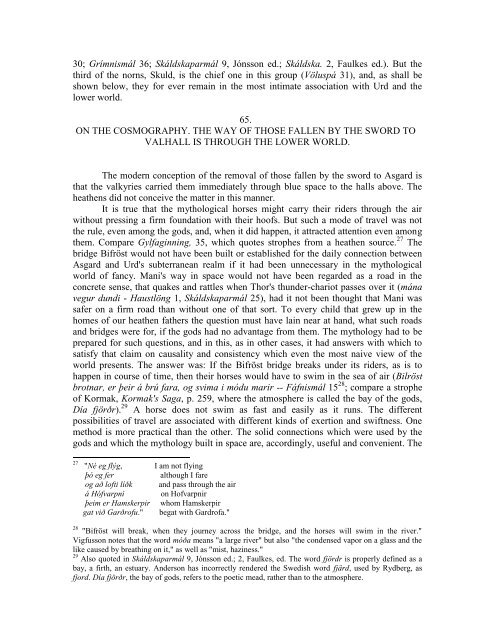Chapters 44-95 - Germanic Mythology
Chapters 44-95 - Germanic Mythology
Chapters 44-95 - Germanic Mythology
You also want an ePaper? Increase the reach of your titles
YUMPU automatically turns print PDFs into web optimized ePapers that Google loves.
30; Grímnismál 36; Skáldskaparmál 9, Jónsson ed.; Skáldska. 2, Faulkes ed.). But the<br />
third of the norns, Skuld, is the chief one in this group (Völuspá 31), and, as shall be<br />
shown below, they for ever remain in the most intimate association with Urd and the<br />
lower world.<br />
65.<br />
ON THE COSMOGRAPHY. THE WAY OF THOSE FALLEN BY THE SWORD TO<br />
VALHALL IS THROUGH THE LOWER WORLD.<br />
The modern conception of the removal of those fallen by the sword to Asgard is<br />
that the valkyries carried them immediately through blue space to the halls above. The<br />
heathens did not conceive the matter in this manner.<br />
It is true that the mythological horses might carry their riders through the air<br />
without pressing a firm foundation with their hoofs. But such a mode of travel was not<br />
the rule, even among the gods, and, when it did happen, it attracted attention even among<br />
them. Compare Gylfaginning, 35, which quotes strophes from a heathen source. 27 The<br />
bridge Bifröst would not have been built or established for the daily connection between<br />
Asgard and Urd's subterranean realm if it had been unnecessary in the mythological<br />
world of fancy. Mani's way in space would not have been regarded as a road in the<br />
concrete sense, that quakes and rattles when Thor's thunder-chariot passes over it (mána<br />
vegur dundi - Haustlöng 1, Skáldskaparmál 25), had it not been thought that Mani was<br />
safer on a firm road than without one of that sort. To every child that grew up in the<br />
homes of our heathen fathers the question must have lain near at hand, what such roads<br />
and bridges were for, if the gods had no advantage from them. The mythology had to be<br />
prepared for such questions, and in this, as in other cases, it had answers with which to<br />
satisfy that claim on causality and consistency which even the most naive view of the<br />
world presents. The answer was: If the Bifröst bridge breaks under its riders, as is to<br />
happen in course of time, then their horses would have to swim in the sea of air (Bilröst<br />
brotnar, er þeir á brú fara, og svima i módu marir -- Fáfnismál 15 28 ; compare a strophe<br />
of Kormak, Kormak's Saga, p. 259, where the atmosphere is called the bay of the gods,<br />
Día fjörðr). 29 A horse does not swim as fast and easily as it runs. The different<br />
possibilities of travel are associated with different kinds of exertion and swiftness. One<br />
method is more practical than the other. The solid connections which were used by the<br />
gods and which the mythology built in space are, accordingly, useful and convenient. The<br />
27<br />
"Né eg flýg,<br />
þó eg fer<br />
og að lofti líðk<br />
á Hófvarpni<br />
þeim er Hamskerpir<br />
gat við Garðrofu."<br />
I am not flying<br />
although I fare<br />
and pass through the air<br />
on Hofvarpnir<br />
whom Hamskerpir<br />
begat with Gardrofa."<br />
28 "Bifröst will break, when they journey across the bridge, and the horses will swim in the river."<br />
Vigfusson notes that the word móða means "a large river" but also "the condensed vapor on a glass and the<br />
like caused by breathing on it," as well as "mist, haziness."<br />
29 Also quoted in Skáldskaparmál 9, Jónsson ed.; 2, Faulkes, ed. The word fjördr is properly defined as a<br />
bay, a firth, an estuary. Anderson has incorrectly rendered the Swedish word fjärd, used by Rydberg, as<br />
fjord. Día fjörðr, the bay of gods, refers to the poetic mead, rather than to the atmosphere.
















